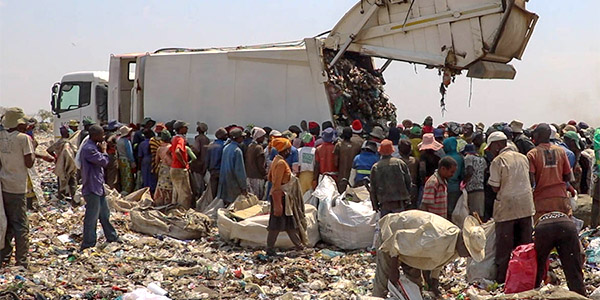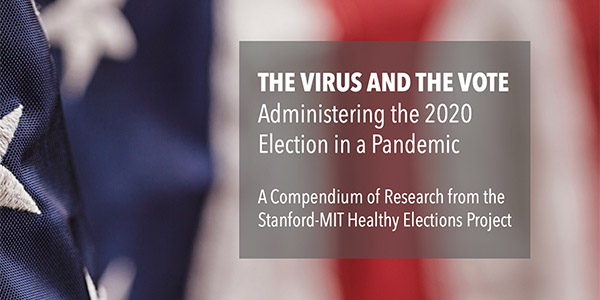Said and Done
JULY 2021
MIT SCHOOL OF HUMANITIES, ARTS, AND SOCIAL SCIENCES
QUOTABLE
How — amidst the enormous challenges of a pandemic — did the 2020 U.S. election become the most secure in American history? Answers in a significant report from the Stanford-MIT Healthy Elections Project.
STRENGTHENING DEMOCRACY
MIT ELECTION LAB | STANFORD-MIT HEALTHY ELECTIONS PROJECT
The Virus and the Vote
"To address the unprecedented threat that the Covid-19 pandemic posed to the 2020 elections, the Healthy Election Project brought together academics and election administration experts to assess and promote best practices to enable the election to proceed with integrity, safety, and equal access." Led by Charles Stewart III, Kenan Sahin Distinguished Professor of Political Science at MIT, and Nathaniel Persily, McClatchy Professor of Law at Stanford.
The Report | Healthy Elections Project
"Even before the pandemic hit, the 2020 election faced significant challenges from disinformation [and] polarization...What was missing was a non-partisan, evidence-based approach to election management during a pandemic. Out of that ambition, the Stanford-MIT Healthy Elections Project was born."
STANFORD-MIT HEALTHY ELECTIONS PROJECT
The Miracle and Tragedy of the 2020 U.S. Election | Stewart and Persily
The miracle: that during a pandemic "election administrators pulled off a safe, secure, and professional election in which a record number of Americans turned out to vote." The tragedy: that "lies about vote fraud...cemented a perception among millions of Americans that the election was 'rigged.' This manufactured distrust has deeply damaged our democracy."
Article at The Journal of Democracy | MIT Election Lab
CENTER FOR INTERNATIONAL STUDIES | STARR FORUM
Advice for President Biden: Dealing with Putin's Russia
Presentations by Andrey Kortunov, Director General of the Russian International Affairs Council and Angela Stent, Professor of Government and Foreign Service at Georgetown University. Co-chaired by Carol Saivetz, Senior Advisor, MIT Security Studies Program, and Elizabeth Wood, MIT Professor of History
Event video on YouTube
IN THE CLASSROOM

Discarded cell phones, computers, and parts of solar panels often end up in dumps like the Richmond landfill in Bulawayo, Zimbabwe. Improperly managed, such landfills pose serious environmental and public health hazards. Photo: Charles Nyembe
"It never really occurred to me that electronics waste, especially solar waste, was such a big issue. It’s one of the most important things I learned at MIT.”
— Julian Dubransky, '21, Humanities and Engineering
SCIENCE, TECHNOLOGY, AND SOCIETY
The first step is seeing it: the global problem of technology waste
Students in STS.032 / Energy, Environment, and Society learn about environmental and health consequences of discarded electronics.
Story via MIT Energy Initiative
DIGITAL HUMANITIES LAB + MIT LIBRARIES
Digital humanities comes to the fore via online hub
Virtual collaboration sessions connect faculty and researchers to new tools, resources, and each other.
Story by Brigham Fay
THEATER ARTS
Going online, Playwrights Lab increases opportunities for students
During the pandemic, Lab leaders used the remote format creatively, realizing that it enabled an increase in the lab’s already strong access to theater professionals, giving students even more opportunities to refine their plays working with high-caliber actors and directors.
Story + Video
SOLVING CLIMATE

Photo by Ed van duijn / Unsplash
"The forest seemed like a system of centers and satellites, where the old trees were the biggest communication hubs, with messages transmitting back and forth through the fungal links...Turning to the intelligence of nature itself is the key."
— Suzanne Simard, forest ecologist
UNDARK MAGAZINE | KNIGHT SCIENCE JOURNALISM AT MIT
Book Review: The ‘Wood Wide Web’ of Plant Communication
In Finding the Mother Tree, forest ecologist Suzanne Simard illuminates the complicated and intimate world of trees. "Turning to the intelligence of nature itself is the key.”
Review at Undark Magazine
ECONOMICS + MATHEMATICS
From entrepreneur to climate policy advocate | Kate Wahnschafft
Whether improving sanitation or addressing climate change, Wahnschafft is drawn to evidence-based methods for tackling social challenges.
Story
UNDARK MAGAZINE | KNIGHT SCIENCE JOURNALISM AT MIT
Book Review: Second Nature by Nathaniel Rich
In Second Nature, Rich brings to life our current reality in which "our tech-driven advances are outpacing our ability to anticipate their impacts."
Review at Undark magazine
MIT SHASS
Solving Climate | Humanistic Perspectives from MIT
Series
MAKING A JUST SOCIETY

Tracie Jones, Assistant Dean for Diversity, Equity, and Inclusion, MIT-SHASS
MIT SHASS
Welcoming Tracie Jones as Assistant Dean for Diversity, Equity, and Inclusion
Dean Jones, who joined the Dean's Office staff on July 1, is one of six new assistant deans who will be advancing DEI initiatives locally and acrosss the Institute. She comes to MIT SHASS from Harvard's Graduate School of Education where she served as the director of Diversity, Equity, Inclusion, and Belonging. Welcome Dean Jones!
Story at MIT News
ABDUL LATIF JAMEEL POVERTY ACTION LAB
Governance and Conflict Initiative | 2021 Evidence Wrap-Up
What are the most promising strategies for preventing and reducing crime, violence, and conflict? JPAL spent the past year compiling lessons from 100+ evaluations — from across the world — to update their 2019 evidence wrap-up. Now, they write "We're excited to share the result, summarized."
Research Report
MIT ELECTION LAB
A powerful tool for election analysis
The pandemic disproportionately impacted voter turnout among communities of color. On the Lab's blog, Jesse Clark, MIT PhD candidate and lab researcher, looked at a new election analysis tool that can be used to identify these disparities.
Commentary
Making A Just Society
Ongoing Series
HEALTHCARE

HEALTH ECONOMICS
Covid-19 vax mandates for school/work are sound policy | Mulligan, Harris
Vaccine mandates for employees are emerging as the most feasible and effective policy to reduce the risk of Covid-19 outbreaks in the workplace. Higher education and healthcare are leading the way in vaccine mandates, while other sectors are beginning to follow their lead. Jeffrey E. Harris is Professor Emeritus of Economics at MIT and a practicing physician.
Online Version | Download PDF
HEALTHY ECONOMIES

ECONOMICS
3 Questions: James Poterba on making infrastructure pay off
In a new study, MIT economist Porterba and Edward Glaeser of Harvard advocate for cost-benefit analyses of projects, find that repairing infrastructure often pays off more than new projects, and suggest that infrastructure user fees be considered as a source of financing for projects.
Story by Peter Dizikes at MIT News
POLITICAL SCIENCE
Are diverse communities more economically successful than homogeneous ones? | Volha Charnysh
Using data from post-WWII Poland, Charnysh finds that communities settled by diverse migrants registered higher incomes and greater entrepreneurship following the transition to a market economy. Their residents also expressed greater confidence in formal institutions, such as courts and the police."
Precis + Paper in American Political Science Review
Related: Charnysh explores aftermath of violence
EXPLORE
Follow us
Subscribe to Said and Done
10 issues a year
Media + Awards Digest
Current coverage
Making a Better World
Browse 12 Research Sectors
Making a Just Society
Explore the Resources
Solving Climate
Browse the Commentaries
Perspectives for the Pandemic
Explore the Series
Ethics, Computing, and AI: Perspectives from MIT
Full Series
Computing and AI: Humanistic Perspectives from MIT
Full Series
MIT Climate website
A major source of research, innovation, and discussion
Join us!
SHASS on MIT News
Research and Features
MIT Campaign for a Better World
Story | Join Us
Published by SHASS Communications
Office of the Dean, MIT School of Humanities, Arts, and Social Sciences
Editor and Designer: Emily Hiestand
Publication Associate: Alison Lanier
Published 15 July 2021






